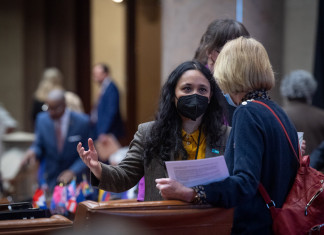Last-minute budget amendments and the County Executive’s vetoes helped deliver a balanced budget for 2014 that falls under the 2 percent tax cap, though home heating costs will rise as a result.
In a meeting that lasted over five hours, the county legislature met Dec. 5 to pass the amended budget with a 16-8 vote that broke mainly along party lines.
The total amount of budget appropriations, after amendments and vetoes, is $439.3 million, which will mean a tax increase of 1.9 percent.
Budget amendments passed by the legislature included reinstating four positions slated for lay-offs or reductions, $10,000 in aid to a homeless shelter, and $20,000 to fund a community garden program for disadvantaged youth. One week later, County Executive Marc Molinaro returned the budget to legislators with vetoes that include the $30,000 for homeless and youth aid, saying those programs should continue to use a grant-funding process already in place.
Most controversial county-wide was the proposal to repeal a sales tax exemption on residential energy sources, including heating oil, electricity and wood. The repeal of the sales tax exemption passed 14-10 but will not go into effect until March 1. It is expected to generate $7.8 million in revenue for the 2014 budget and would be a recurring revenue source. As a sales tax, 18.5 percent will be shared with municipalities across the county based on the current contract for sharing those revenues.
In a memo to legislators that outlined his vetoes, Molinaro placed the blame for the hard budget decisions on unfunded mandates from the state. “Without meaningful mandate relief, the county continues to be forced into paying for Albany’s spending decisions with local tax dollars,” he said. According to Molinaro, as much as 70 percent of the budget is due to mandates.
Legislator Debra Blalock (D), who represents Milan and three other towns, disagrees with Molinaro on the budget choices. “Over past years, there are those of us who have offered various measures that have saved considerable money for other counties throughout the state and country, but our attempts at saving taxpayers’ funds were refused in favor of cutting jobs, restructuring the county’s approach to the various nonprofit agencies that serve our population and now repealing the sales tax exemption on residential energy,” she told the Observer.
Blalock voted “no” on the budget because she could not support the methods it was based upon.
Legislator Sue Serino (R), who represents Hyde Park, said she thought there were other solutions besides raising the energy sales tax to the maximum amount of 3.75 percent. She voted no on the repeal of the sales tax exemption, but yes on the budget because she didn’t want the county to lose critical services.
Serino said she hopes next year the legislature can work on budget issues all year long because the time between Nov. 1, when the county executive’s tentative budget is delivered, and Dec. 10, when the legislature is supposed to adopt, is too short for research into options.
She said many cost-saving options were researched going into the budget vote but few made it to the floor. “It wasn’t that [legislators] weren’t trying. We were trying, but I think [county leaders] were on the path to do this all along and there was no deterring them,” she said.
In his memo, Molinaro said that repeal of the energy sales tax exemption was the “only remaining option” to pay for mandates that include Medicaid, child welfare, preschool special education, early intervention, indigent defense, probation, youth detention, and pensions. The programs cost the county $111 million, according to Molinaro, not including staff and administration costs.
Rich Perkins (D), who also represents Hyde Park, told the Observer he wished the legislature had voted to override the tax cap and worked harder to reduce spending in the budget in order to have more options for closing the budget gap. “A combination of things would have been much better…reducing some of the budget, increasing the property tax slightly, and then possibly repealing the energy exemption but only at a smaller percentage. I think that would have been a lot fairer,” he said. He voted against the energy sales tax and “no” on the budget.
Joel Tyner (D), who represents Clinton and Rhinebeck, proposed several amendments, including the $10,000 for Hudson River Housing and $20,000 for Cornell Cooperative Extension’s gardening program. Tyner voted no on the budget, even including his amendments, and also voted against the sales tax exemption repeal.
Ben Traudt (R), represents Red Hook, and said he feels overall, the budget is responsible because it is balanced. Traudt voted for the amendment to restore the four positions and money for Hudson River Housing and Cornell Cooperative Extension. He voted yes on the budget and for repealing the sales tax exemption, but he said, “It was a tough decision for me to come to… My major concern was that people of lower income would feel the effects of it more than others.”
The legislature has until Dec. 20 to override the vetoes with a two-thirds majority vote and was expected to vote on any overrides at its last scheduled meeting Dec. 16.







Facebook Comments